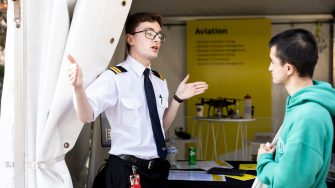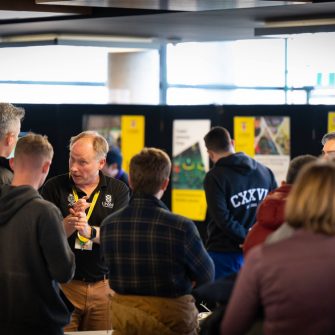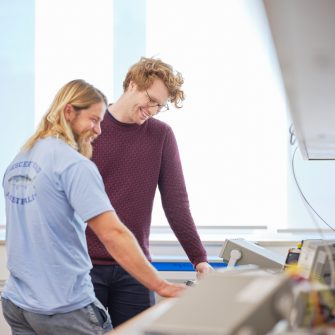Bachelor of Technology (Aeronautical Engineering) (Canberra)
- Commencing Terms
- Semester 1
- Duration
- 3 Year(s)
- Delivery Mode
- Face-to-face (includes blended)
- Campus
-
Canberra
- Codes
- UAC code 450080
- Program code 4430
- CRICOS code -
-
ATAR/2025 lowest selection rank
- 85.0 View all admission criteria
-
2026 Indicative first year full fee
- $9,000*
-
2026 Indicative full fee to complete degree
- $27,500*
-
2026 Indicative first year full fee
- -
-
2026 Indicative full fee to complete degree
- -

The Australian Defence Force Academy
Combining teaching and research with military education
UNSW Canberra specialises in high-quality undergraduate and postgraduate courses in all areas relating to military, strategic and defence studies. This means future leaders of the Navy, Army and Air Force can combine their military and leadership training with our world-class university programs and defence industry expertise.
- Overview
- Entry requirements
- What will I study?
- Future careers
- How to apply
- Fees
Overview
Launch your Australian Defence Force (ADF) career by studying a Bachelor of Technology (Aeronautical Engineering) at UNSW Canberra. Designed to meet the evolving demands of the Australian Defence Force (ADF), this degree equips you with specialised skills in aircraft design, engine performance and aerospace technology. Gain hands-on experience with industry-standard tools and access to state-of-the-art facilities.
As ADF Trainee Officers, you’ll learn from leading experts in aeronautics and engineering. Through a blend of foundational science, engineering principles and discipline-specific courses, you’ll develop the problem-solving skills to address real-world challenges in aerospace and Defence.
With a Bachelor of Technology (Aeronautical Engineering), you’ll be ready to take on vital roles in aeronautical engineering, from designing advanced aircraft systems to innovating sustainable solutions for the future of aviation.
Key features
Professional accreditation
UNSW Canberra’s Bachelor of Technology (Aeronautical Engineering) is accredited by Engineers Australia, providing you with professional recognition from day one and opening doors to engineering roles in aerospace and Defence in Australia and around the world.
Defence-focused aeronautical expertise
Learn from industry-experienced professionals who work closely with the Defence and aerospace sectors, developing specialised skills tailored to Australian Defence Force requirements. This targeted expertise prepares you for critical roles in Defence, equipping you to make an immediate impact upon graduation.
State-of-the-art facilities
Access advanced aeronautical technology at the Australian Defence Force Academy (ADFA) state-of-the-art engineering facilities. You’ll get hands-on experience with industry-standard tools, preparing you for the technical demands of Defence and aerospace engineering roles.
Why study at UNSW Canberra?
Defence-driven education
UNSW Canberra is the only university in Australia with an exclusive focus on Defence and military studies, offering a curriculum directly aligned with ADF needs. Studying here means gaining industry-specific knowledge and skills that set you up for success in the Defence and aerospace sectors.
Build leadership skills
As ADF Trainee Officers, you will be studying in a leadership-focused environment. This experience builds critical skills in teamwork, resilience and strategic thinking, ensuring you’re prepared for high-stakes roles that require both technical expertise and leadership.
Pathway to further study
Deepen your expertise and expand your career prospects by upgrading to a Bachelor of Aeronautical Engineering (Honours) with an additional 12 months of study. Entry to the Bachelor of Aeronautical Engineering (Honours) at UNSW Canberra will be at the discretion of the Defence Services.
Want to see more from UNSW Canberra at ADFA?
Entry requirements
-
- The 2025 Lowest Selection Rank (LSR) is the adjusted rank (ATAR plus adjustment factors) you would have needed to gain entry to this degree in 2025.
- The 2025 A levels score is based on four Advanced Level (A2) subjects. Entry scores are calculated from the best three or four A2 subjects (excluding repeated subjects) using the following values: A*=6, A=5, B=4, C=3, D=2, E=1. At most one Applied A Level subject may be included in the best four subjects used to calculate the aggregate.
- The 2025 IB Diploma is an indication of the IB you would have needed to gain entry to this degree in 2025. It is to be used as a guide only.
- The 2025 Lowest ATAR is the lowest ATAR (before adjustment factors were applied) to which an offer was made. Where <5 is listed, this indicates that less than 5 ATAR-based offers were made and so the score has not been published. N/A indicates no offers were made on the basis of ATAR.
*The Lowest ATAR to which an offer was made, for this program, is based on a UNSW Gateway Early Conditional Offer.
-
At UNSW, we are committed to ensuring prospective students have all the information they need in order to make informed decisions about their study options.
To assist you in gaining a better understanding of how Admissions works at UNSW, we have provided you with a summary of ATAR offers and the student profile.
We hope this information will help you identify the degree that is right for you.
Additional Selection Criteria
Undergraduate entry to the Australian Defence Force Academy (ADFA) is open to Australian residents who are members of the Australian Defence Force and selected members of overseas Armed Forces. Trainee Officers are selected by one of the three services (Navy, Army or Airforce) in the Australian Defence Force and must also meet academic entry requirements for UNSW Canberra at ADFA. Applying for ADFA is a dual application process. As selection for the Australian Defence Force is a competitive process, which can take up to 12 months, it is preferable that you apply to Defence Force Recruiting in Year 11. Visit this site for more information on both application processes.
Assumed knowledge
Mathematics, Physics
Adjustment Factors
We offer a range of adjustment factor schemes that reward students for academic performance and extra-curricular achievements. These schemes also take into account a range of personal and educational disadvantages that may have affected your studies.
HSC Plus
This scheme rewards students who perform well in Year 12 subjects that are relevant to their preferred UNSW degree. You may be awarded up to five points.
Elite Athletes, Performers and Leaders (EAPL)
This program recognises achievements in the areas of sport, academia, leadership and music at an elite level. You may be eligible for up to five points.
Educational Access Scheme (EAS)
Factors such as illness, financial hardship, language difficulties or attending a particular school can mean you don't always get the best possible marks in Years 11 and 12. If one of these situations applies to you, submit an application for the Educational Access Scheme (EAS) via UAC. Eligible students can receive between 1 and 10 points towards their chosen UNSW degree.
Admission pathways
Your ATAR is not the only measure of your potential to succeed, which is why we offer a range of pathways into university. Explore your options below and get in touch with our Future Student Advisers to discuss your path to UNSW.
Gateway Admission Pathway
This scheme is open to students who attend Gateway schools, live in a low-socioeconomic area based on IRSAD and IEO indexes of SEIFA criteria, or are an Aboriginal and Torres Strait Islander person. It adjusts the ATAR requirements for your preferred UNSW degree and provides early offers and early conditional offers to UNSW.
Entry programs for Australian Aboriginal and Torres Strait Islander people
We offer entry programs for Indigenous Australians, including the Indigenous Preparatory Programs and the Indigenous Admission Scheme (IAS). The entry pathway program you apply for will depend on the degree you want to study.
English language requirements
You may be asked to provide evidence of your English proficiency to study at UNSW depending on your educational background and citizenship. English language skills are vitally important for coping with lectures, tutorials, assignments and examinations - this is why UNSW requires a minimum English language competency for enrolment.
If you’re completing an Australian Year 12 qualification (e.g. NSW HSC or equivalent), you do not need to provide anything extra to prove your proficiency. Your qualification will be used as evidence of your English proficiency.
If you do need to provide evidence of your English proficiency, this will be indicated in your application. You can prove this by providing evidence that you meet one or more of the following criteria:
- English language tests and university English courses
- Prior study in the medium of English
- Other qualifications
If you need to improve your English skills before you start your degree, UNSW College’s Academic English Programs are for you. The programs are suitable for various English levels and help you prepare for university studies and life in Australia.
For more details, visit the English Language Requirements page.
What will I study?
UNSW is introducing a new academic calendar from 2028.
We are moving to a new flex-semester calendar. What does this mean for your studies?
Program structure
In the Bachelor of Technology (Aeronautical Engineering) program, you’ll build a strong foundation in engineering principles. You’ll study core subjects in mathematics, physics and programming, essential for all engineering disciplines, before advancing to aeronautics-specific topics like flight dynamics, thermofluids and structural mechanics.
In your final year, you’ll complete a capstone project, applying your knowledge to solve real-world engineering challenges. This course structure ensures you graduate with both the theoretical expertise and practical skills needed in the aerospace and Defence industries.
Full program structure
The Bachelor of Technology (Aeronautical Engineering) is a three-year full-time program. Students will complete 144 Units of Credit (UOC).
-
- Introduction to Programming
- Engineering Practice and Design
- Engineering Mechanics
- Introduction to Mechanical, Aeronautical and Naval Architecture Engineering
- Engineering Mathematics 1A
- Engineering Mathematics 1B
- Computational Problem Solving
- Engineering Physics 1A
-
- Thermofluids
- Mechanical and Electronic Design
- Fundamentals of Flight
- Fluid Mechanics
- Mechanics of Solids
- Engineering Materials and Chemistry
- Engineering Mathematics 2A
- Engineering Mathematics 2B
-
- Engineering Structures
- Engineering Materials
- Aerodynamics
- BTech Project and Practical Experience
- Introduction to Cyber-Security: Policy & Operations
-
- Vibration and Control Engineering
- Aircraft and Systems Design 1
- Flight Dynamics and Aircraft Control
- Computational Fluid Dynamics
- Rotorcraft Engineering
- Integrated Mechanical Design
- Hypersonics and Advanced Propulsion
- Microcontroller-based Instrumentation
-
One of the following:
- Introduction to Strategic Studies
- Strategy, Management and Leadership
And one of the following:
- Law, Force and Legitimacy
- Introduction to Military Ethics
Future careers
Potential careers
Graduates of the Bachelor of Technology (Aeronautical Engineering) are entering an evolving aerospace and Defence sector, where the demand for skilled engineers is steadily increasing. With advancements in drone technology, sustainable aviation and Defence systems, aeronautical engineers are essential for designing the next generation of aircraft and supporting critical air operations.
In Australia, the aerospace engineering sector is projected to grow as much as 10% over the next five years, according to the Australian Bureau of Statistics. With this degree, you’ll be prepared to tackle industry challenges, drive technological innovation and contribute to a safer, more sustainable aerospace future.
As an ADF Trainee Officer, you’ll graduate with an enhanced understanding of the operation and performance of aircrafts, leading you towards aircrew careers including:
- Army Officer
- Helicopter Mission Commander
- Helicopter Pilot
- Mission Aircrew
- Mission Controller
- Pilot
Accreditation
Engineers Australia
How to apply
Applications for undergraduate study from domestic students (Australian citizens, Australian permanent residents, Australian permanent humanitarian visa holders and New Zealand citizens) are processed by the Universities Admissions Centre (UAC).
Visit the Apply section of the UAC website and you can nominate up to five degrees in order of preference, with the first being your most desired degree and university.
On-time applications for admission usually close at the end of September each year for Term 1 admission. Late applications can be submitted, but a late fee will apply. For study starting in Term 1, the majority of offers are made in December and January. Visit the UAC website for key dates for admission outside of Term 1.
Applying for programs at UNSW Canberra at ADFA is a dual application process. In addition to applying via UAC you will also need to apply via ADF Careers for an officer role within the Australian Defence Force. As selection for the Australian Defence Force is a competitive process, which can take up to 12 months, it is preferable that you apply to Defence Force Recruiting in Year 11.
Visit our how to apply page for more information on both application processes.
Ready to start your application?
Fees & Scholarships
The Australian Defence Force covers tuition fees for defence students.
Progress starts here – at a world-leading university

Top 20 Worldwide
Ranked in the global top 20 for three consecutive years
QS World University Rankings, 2024–2026

Winner of the AFR Most Employable University Award six years in a row
AFR Top100 Future Leaders Awards, 2020–2025

Australia's #1 for Innovation
Highest number of startups and spinouts from university-developed tech
SCOPR report, 2024



